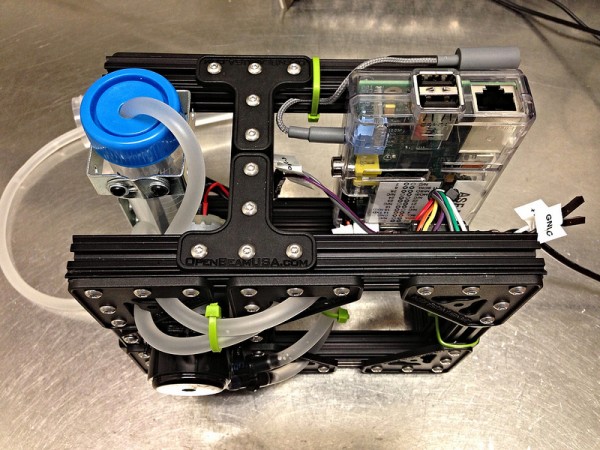Infusion pumps dispense fluid over a set amount of time. In hospitals they are used to deliver medication for treatments like chemotherapy and pain management, while laboratories use them for everything from microfluidics to bioprinting.
Fechko’s peristaltic pump
Fechko [i] built a peristaltic pump (see figure 2) using a Raspberry Pi single-board computer and a standardised T-slot profile construction set called OpenBeam. The pump was designed as a fluid reward system for laboratory animals, but can be adapted for other uses as well.

Figure 2 Raspberry Pi Peristaltic Pump (Photo by AmberFechko, image licensed under the Creative Commons BY-SA
license).
The electronics consist of modular components that do not require soldering. The electronics used are an Arduino or Raspberry Pi and components easily obtained from open-source hardware distributors. Source code is available for Arduino, using a motor shield, and Raspberry Pi, using either a Gertboard or L293D motor control chip. All components used are available off-the-shelf and no special skills are required to build the pump.
Wijnen et al’s syringe pump
Wijnen et al published a complete open-source syringe pump library, consisting of a series of 3D-printable parts to build a syringe pump. Performance of the syringe pump was assessed and the methods used for assessment are detailed. The design, bill of materials and assembly instructions are publicly available. The 3D-printable parts can be modified using an open-source parametric 3D design tool, called OpenSCAD [ii] and derivatives like OpenPump [iii] [iv] have already been created.
To build the device a 3D printer, or 3D printing service, can be used to print the necessary parts. The electronics are based on a Raspberry Pi, stepper motor and driver components that can be obtained from open-source hardware distributors. Most mechanical components can be obtained from a local hardware store. Some specialist components like ball bearings, linear bearings and flexible couplings can be sourced online. Source code is available for the Raspberry Pi.
[i] Fechko A. Peristaltic pump reward system. https://github.com/dendriticspine/Peristaltic-Pump-Reward-System. http://www.webcitation.org/6ZtSTQt8y
[ii] OpenSCAD. http://www.openscad.org/. http://www.webcitation.org/6Yc3Wdohf
[iii] Niezen G. OpenPump. http://openpump.org/. http://www.webcitation.org/6T1manphl
[iv] Vincent CJ, Niezen G, O’Kane AA, et al. Can standards and regulations keep up with health technology? JMIR mHealth uHealth 2015;3:e64.

